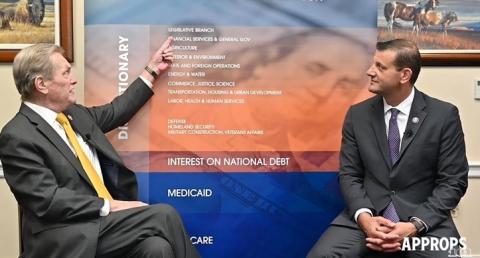Managing Congressional Resources: Subcommittee Chairman Valadao's Perspective
Next up in the Appropriations 101 series, Interior and Environment Subcommittee Chairman Mike Simpson (R-ID) sat down with newly appointed Legislative Branch Subcommittee Chairman David Valadao (R-CA) to emphasize the significance of the Legislative Branch Appropriations bill, which is central to our democracy and serving constituents across the nation.
In this video, the two Cardinals discussed the common misconceptions of the Legislative Branch bill and the various approaches Members take to manage their office resources.

Watch Subcommittee Chairman Simpson and Subcommittee Chairman Valadao’s conversation here.
Simpson: “Tell us a little bit about the Legislative Branch Appropriations bill. You've become the new chairman, and it's more than just what is appropriated to [Members]. There are other things that are appropriated. They're very important in the Leg. Branch bill. So, tell us a little bit about it, and what the challenges are that you face.”
Valadao: “Legislative Branch, when you think that, you think immediately of the building itself and legislators. But I think people forget how much of a role the funding of that bill helps us as Members of Congress, communicate and educate ourselves and prepare ourselves for when we legislate. Things like the CRS (Congressional Research Service), to make sure that we have the most up-to-date and accurate information when we are writing those bills. And then when we vote, what maintains the voting systems, the networks that people at home can watch what we're doing, so it keeps that open and transparent government. And then when we actually have those actions, our office's ability to use different technology that the House makes available to them so they can record, produce, and actually publish some of the information or social media platforms or your computers or your offices themselves. Keeping the building safe so that people, if they come here to visit, or us as Members and our staff, have a safe place to work or visit. And you also have to worry about making sure that we maintain the integrity of the building. When you look at the Capitol, it is the background of so many different news organizations and so many different beautiful pictures. Making sure that the building is taken care of and maintained so that it's there for future generations to enjoy. But also under Legislative Branch, we have the funding for the Supreme Court, the Library of Congress, and so many other things that are important to our constituents. It is an important bill, but yes, it's such a small bill that sometimes people overlook it a little bit.”
Simpson: “Tell me how the MRA (Members Representational Allowance) works. This is how Members of Congress get funded.”
Valadao: “So, Member Representational Allowance, the MRA as it is more commonly known, is the amount of money that is allocated to each Member of Congress to operate their offices. We pay our staff out of that, we fix our computers, buy computers, buy phones, pay for our travel, lease our offices in our district, and pay our electric bills. I mean everything from the most minor - purchasing toner for your printer and ink and pens - to making sure that you have a staff. And you make decisions on how to allocate those dollars. Each individual office makes those decisions. The Committee sets, or approves, the number and funds those numbers. But each Member of Congress has jurisdiction over those dollars, and again, those dollars are what we use as Members of Congress to take care of our offices and manage our offices, and it's how we represent our districts. Our pay as Members of Congress is the only thing that's not included in that."
…
“We're competing with the private sector, just like anyone else. A lot of times you hire young staff, and this is their first job, and then they work their way up, gain a lot of experience in the building. And sometimes they get hired away to bigger and better things. Sometimes back at their homes, or in the districts, or sometimes here in Washington working for different agencies. There's lots of opportunity out there, but our opportunity to be able to keep them here is our ability to be able to pay them to make it competitive.”
Simpson: “What happens if I overspend my budget?”
Valadao: “You pay personally. No one will come in and save you on that, so it forces us to be as mindful of how we spend those dollars as possible. Because, you, as a Member of Congress, are responsible ultimately for your Member Representative Allowance. But to your point earlier, yes, you have people who represent areas that you could literally walk in a circle and cover their whole district. Typically, those offices cost quite a bit more, and there are little differences between our MRA amounts. I live in California. You live in Idaho. I would say our travel back and forth is probably pretty similar. But our cost per office - I only have two district offices - is probably a lot less than what someone would be paying in Chicago or San Francisco or New York.”
###
